#dom phillips
Text
Murdered journalist Dom Phillips’ unfinished book to be published in 2025
How to Save the Amazon: Ask the People Who Know will be completed by writers and environmentalists thanks to a grant from the Whiting foundation
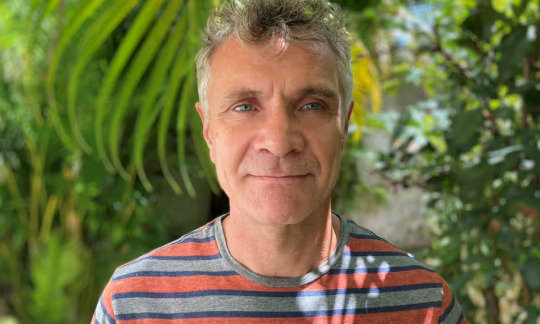
A book begun by Dom Phillips, a foreign correspondent and Guardian contributor who was killed in the Amazon in June last year while researching the project, will be published in April 2025.
The book, titled How to Save the Amazon: Ask the People Who Know, is being completed by writers and environmentalists. On Wednesday, the authors were awarded a Whiting creative nonfiction grant, marking the first time the $40,000 (£32,000) award has been given to a collaborative project.
The judges of the Whiting foundation grant said that Phillips’ reporting on “ecological depredations in the Amazon, completed before his murder in the field, demonstrates impressive levels of access and a deep moral curiosity.
“It’s rare to encounter travel writing that truly shows the reader something they haven’t seen before; the sense of discovery – and, inevitably, peril – is palpable,” they added.
Continue reading.
#brazil#brazilian politics#politics#environmentalism#environmental justice#dom phillips#amazon rainforest#books#mod nise da silveira#image description in alt
36 notes
·
View notes
Photo
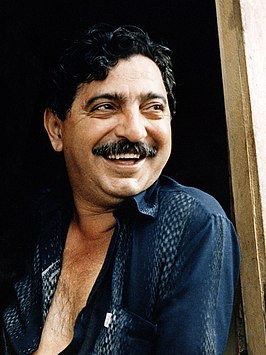


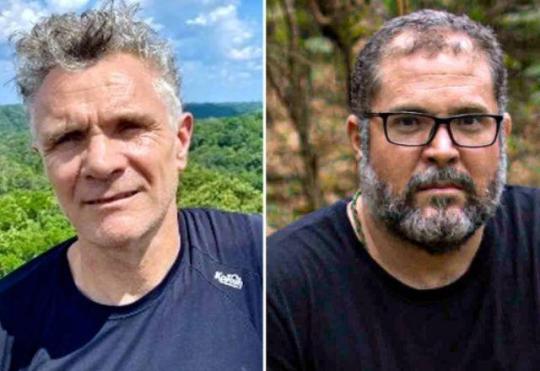
Some environmentalists killed in Brazil (R.I.P. ♰)
Chico Mendes, Dorothy Stang, José Cláudio Ribeiro, Maria do Espírito Santo, Dom Phillips (journalist) & Bruno Pereira
#Chico mendes#dorothy stang#José claudio ribeiro#maria do espirito santo#dom phillips#bruno pereira#heroes#environmetalists#jungle#environmentally#environment#logging#killed#murder#fauna#flora#forest preservation#preservation of indigenous culture and people#Brazil#sad#Brasil#preservação#ambiental#cultura#pessoas#cultura indígena#awareness#let the world know
60 notes
·
View notes
Text
by Katharine Viner
The Guardian
June 1, 2023
On 5 June 2022, Bruno Pereira and Dom Phillips were killed for protecting the Amazon rainforest. A new collaboration aims to continue what they started
Forest defenders should not be killed for exposing crimes. Journalists should not be killed for reporting facts.
But, one year ago, the Guardian was devastated by the awful news that in the Amazon rainforest, two lives had been taken on the frontline of the battle to protect the planet.
Bruno Araújo Pereira, a renowned defender of the rights of Brazil’s Indigenous peoples, and Dom Phillips, an outstanding reporter, long-term Guardian contributor and friend to many who work here, disappeared while researching a book on how to save the rainforest.
In the weeks that followed, when their bodies were discovered and our worst fears of their deaths confirmed, everyone at the Guardian was horrified. And from that horror was born a determination to continue the work they were doing, covering what our global environment writer, Jonathan Watts, has called “the global war against nature”.
Today, we launch the Bruno and Dom project, a year-long collaborative investigation coordinated by Forbidden Stories that involves more than 50 journalists from 16 media organisations in 10 countries around the world.
Together, we have worked with three aims in mind.
First, to honour and pursue the work of Bruno and Dom. Bruno was totally committed to the traditional peoples of the Amazon and defending their ways of life, and Dom’s brave and humane journalism did so much to bring the stories of Brazil and Latin America to a global audience. We have picked up the threads of their unfinished stories, chased down leads and tried to carry on doing what they can no longer do.
Second, to remind everyone of the beauty, importance and fragility of the Amazon. Watts, who moved to live in the rainforest in 2021 and is the Guardian’s first journalist to be permanently based there, has written about it being the heart of the world – “not the lungs, as is often mistakenly claimed”. But now it beats much less strongly than it did, and than it must, if human beings on this planet are to have a future.
Third, to suggest ideas for how to save the Amazon, and, in time, inspire positive change. This was a central focus in all of Dom’s work, and something that much Guardian journalism strives for.
The Bruno and Dom project, over four days of publishing, will include:
The latest in the criminal investigation into their deaths, including the perspective of friends and family. Three men are currently being held in prison, and police have named a fourth as the alleged mastermind, while the former head of Brazil’s Indigenous protection agency under President Jair Bolsonaro has been charged on the basis that he ignored warnings over the risk of bloodshed in the Javari valley.
The last photographs taken of Bruno and Dom before they were killed, and what they tell us.
A wider exploration of how organised crime, including illegal fishing, hunting, logging and mining, is taking over the Amazon.
An investigation into the global companies making billions from extracting raw materials from the rainforest, including how beef is eating up the Amazon, and the extent of deforestation.
A detailed analysis of solutions for how to save the rainforest.
Read more.
3 notes
·
View notes
Photo

Não podemos mais aceitar que defensores da natureza sejam assassinados no Brasil. Segundo a Global Witness, o aumento de ameaças e mortes tem sido documentado desde 2018. Somos o 4º país mais perigoso para indígenas e ambientalistas no mundo e devemos nos envergonhar do tamanho descaso da Justiça e do governo, fazendo pressão por ação concreta e mudança.
Bruno Pereira formava equipes de vigilância indígena contra criminosos na fronteira com o Peru. Nessa viagem, acompanhava o jornalista britânico Dom Philips durante apuração para um livro sobre as violações que ocorrem na Terra Indígena do Vale do Javari, território onde vivem povos de recente contato e isolados.
Nos solidarizamos com as famílias e amigos das vítimas que têm se arriscado para defender a Amazônia e a floresta em pé, por defenderem seus territórios, o direito à terra, seus meios de subsistência e o meio ambiente. Estamos em luto por Bruno Pereira, Dom Philips e por assassinatos de indígenas, ribeirinhos, quilombolas, extrativistas, lideranças de movimentos populares, defensores do meio ambiente e defensores dos direitos humanos que estão na floresta e correndo risco diariamente.
Que o governo brasileiro atue sem demora para responsabilizar os culpados e para impedir que esse clima de terror continue. Quem mandou matar? Por quê?
18 notes
·
View notes
Text
The outpost is intermittently frequented by members of Univaja, the Indigenous rights collective for whom [Bruno] Pereira had worked. But it is currently manned by a lone resident: a 76-year-old Peruvian named Juan da Silva and his black labrador mutt. Equipped with a torch, a fishing rod, a few cans of food and occasionally a radio, he fears for his life every night.
"I want to get out of here,” says Da Silva. “I don’t want to die. I want to live.”
The outpost is where [Dom] Phillips and Pereira slept the night before they were killed. Da Silva points to the hooks that held their hammocks, bolted to wooden posts under a small porch.
Pereira had slept on the right side of the building, which overlooks a small estuary used by illegal fisherman to enter a lake with thousands of valuable pirarucu fish – and a pathway into Indigenous land that evades a government checkpoint a few miles upstream.
"The fishermen get very angry if we don’t let them through,” Da Silva says, pointing to the stream, where a shaggy crested Amazon kingfisher sits on a branch scouring the water. “Sometimes I can’t stop them, because if I did they would kill me.”
Such are the contrasts in this underreported part of the Amazon rainforest where magnificent natural beauty has become a backdrop to increasing violence and impunity. It is the setting for a battle over access to resources that has intensified following the election of Brazil’s far-right president, Jair Bolsonaro, in 2018.
Law enforcement officials say the Javari Valley, an area the size of Portugal and home to the world’s largest concentration of uncontacted Indigenous tribes, is now Brazil’s second largest drug trafficking route, where the interwoven illicit industries of fishing, logging and mining have proliferated over the past decade.
Pereira had worked with villagers here, trying to steer them away from illegal fishing – many of the river’s species are subject to strict regulation to manage stocks, and it is prohibited to fish in Indigenous territory further upstream. But a single pirarucu, one of the world’s largest freshwater fish, which grows to over 100 kilograms, can be sold for $1,000 at market price, while a single Amazon river turtle can be sold for $200.
Locals say illegal activities have become commonplace in recent years. One villager recently spotted a boat with three men carrying shotguns, laden with illegally caught fish. Illegal fishermen use small boats, laden with ice, to navigate into Indigenous land under cover of darkness, according to a report by Univaja, and then return to deliver their catches to larger boats waiting on the main river.
#amazon rainforest#indigenous rights#dom phillips#bruno pereira#fishing#fishing industry#illegal fishing#jair bolsonaro#logging#illegal logging#environment#Brazil
6 notes
·
View notes
Video
Link | Shared by Rafael Silva via IG Stories - August 5, 2022
3 notes
·
View notes
Link
Journalist Dom Phillips has been missing in the Amazon for several days with his indigenous companion Bruno Pereira. While his work as.a journalist for the Guardian has been reported extensively, his blogposts for Folha de São Paulo are less well known,
#Dom Phillips#Folha#Leaf#São Paolo#newspaper#newspapers#journalist#reporter#Leaf or Sheet#The Guardian#Americas#Amazon#Amaszonas#Brazil
1 note
·
View note
Text
Christmas gift
a/n: more delicious graves for y’all because I personally believe he’s a 5’9 brat who should be my husband instead
minors DNI
"Fuck! Darling that's too damn big, you’re splitting me open every damn chance you get" graves whined as he felt you pull down his boxers for what must been the fifteenth time today. But he was on holiday break, and you had missed him while was gone on missions.
"You’re only half way on, graves" you hum as you thrust into him with ease, your previous rounds making the slide in very easy. His aching member laying against the kitchen table where he was making cookies till you interrupted.
"Please, please darlin" the words fell out of his pretty lips like a praise more then a title, his eyes shut tight and his hips desperately trying to match your fast thrusts as you bucked into him
"Oh god! Love, slow down!" he cried as he felt the burning sensation of cumming dry from the hours you two had spent, bending him over every surface in the house until his gummy walls were carved in the shape of your length. His vision cloudy and his breath uneven as his grip slipped from the table an onto your shoulders as you bullied his prostate and over-sensitive nerves.
graves had teased you about his Christmas gift last night being himself, and god did you take it seriously. He could feel the lingering burns of your hickeys and kisses along every inch of his skin and his hole fluttering around you oh so prettily. You were addicted to even the sight of his pretty hips flush against yours.
His jaw went slack and fell open, pretty moans and whimpers and broken begs falling out loud enough the neighbors could probably hear. Not that he minded, of course. The frosting he had made for the cookies now stained on his shirt which used to be yours. Maybe he wouldn’t come home next Christmas just to be a brat. And just to know you’d do even worse then. You’d probably pull you by the scruff of his neck from his base in front of his men and drag him home like the good husband you are
#coyotes_horde#call of duty x reader#cod x you#bottom character#cod x male reader#sub character#top reader#dom reader#bottom charecter#mlm smut#Bottom Phillip graves#phillip graves cod#phillip graves x male reader#phillip graves smut#phillip graves x reader#phillip graves#philip graves x reader#graves x male reader#graves smut#graves x reader#graves x you#graves cod#graves mw2#graves mwii#gay smut#tw: smut#tw smut#cod smut#cod x reader#bottom graves
2K notes
·
View notes
Text
Brazil’s Javari valley is under threat. Lula’s government must protect it and its people
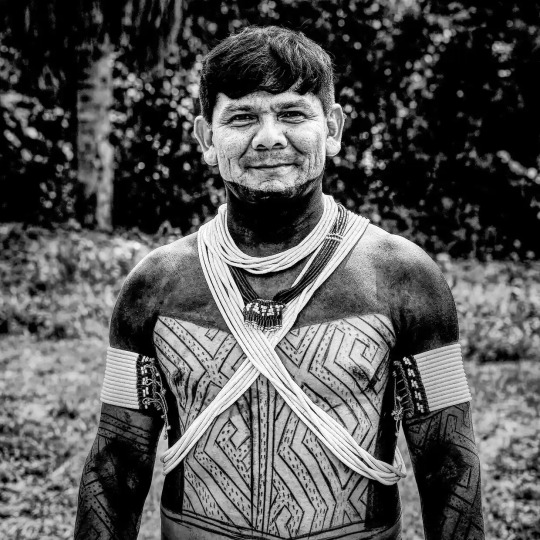
Among my people, the Marubo, knowledge is transmitted through oral history, passed down by elders throughout the centuries. For many generations these stories described the approach of people we call nawas – outsiders who always brought misfortune, usually in search of natural resources from the forests we inhabit.
My ancestors spoke of Catholic missionaries from Spain and Portugal, of Peruvian rubber barons and logging companies. The stories my generation tells are of fundamentalist evangelical missionaries, illegal miners and fishing gangs bankrolled by drug trafficking networks.
This situation has made the Javari valley Indigenous territory, where the Marubo and six other contacted Indigenous peoples live, as well as 16 isolated groups, a dangerous place for Indigenous leaders and journalists.
It was here, on 5 June 2022, that one of these invaders murdered the Indigenous expert Bruno Pereira and the British journalist Dom Phillips, a longtime Guardian contributor. At the time of his death, Bruno was working with me at the Javari valley Indigenous association, Univaja.
Continue reading.
#brazil#politics#environmental justice#indigenous rights#brazilian politics#amazon rainforest#dom phillips#bruno araujo pereira#mod nise da silveira#image description in alt
101 notes
·
View notes
Text
Brasil: lancha de Bruno e Dom é encontrada afundada em rio do Amazonas
Brasil: lancha de Bruno e Dom é encontrada afundada em rio do��Amazonas
Brasil: lancha de Bruno e Dom é encontrada afundada em rio do Amazonas
A força de segurança que investiga os assassinatos do indigenista Bruno Araújo Pereira e do jornalista britânico Dom Phillips localizou a lancha na qual a dupla viajava quando foram emboscados e mortos, no dia 5 de junho.
Segundo a Polícia Civil do Amazonas, a embarcação estava submersa a cerca de 20 metros de profundidade no…
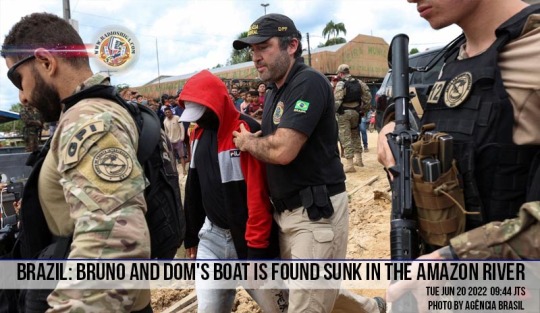
View On WordPress
0 notes
Link
5 notes
·
View notes
Text
Raiva e indignação
Raiva e indignação. Demorou 10 dias após o desaparecimento do jornalista britânico Dom Philipps e do brasileiro Bruno Pereira para que a morte dos dois homens fosse confirmada #JustiçaParaDomeBruno #blogdodcvitti
ツ
Demorou 10 dias após o desaparecimento do jornalista britânico Dom Philipps e do brasileiro Bruno Pereira para que a morte dos dois homens fosse confirmada, após a confissão de um dos suspeitos admitir ter enterrado seus corpos.
10 dias de imbróglio, durante os quais os esforços do governo para encontrar os dois homens foram extremamente lentos e insuficientes, durante os quais a investigação foi…

View On WordPress
#blogdodcvitti#dcvitti#DialisonCleberVitti#2022#@dcvitti#Amazônia#ツ#blog do dcvitti#Bruno Araújo Pereira#Cleber Vitti#Dialison#Dialison Cleber#Dialison Cleber Vitti#Dialison Ilhota#Dialison Vitti#Dom Phillips#Feed#Fora Bolsonaro#Ilhota#Jornalismo#Newsletter#Repórteres Sem Fronteiras#União dos Povos Indígenas do Vale do Javari#Vale do Javari#Vitti
0 notes
Text
pretty ol’ thing
a/n: today one of my friends decided to judge what I was eating and now I feel bad 😀👍, anyhow enjoy some slutty graves
minors DNI
“fuck..” graves hummed to himself as he tugged on his lacy lingerie he was wearing, trying to get it to look just right in the mirror. You had been gone with work for the entire day and he was antsy- and horny. All his toys just didn’t fill him up as nicely as you did! He wanted you, and he wanted you home now.
so? He set up his phone, and put on your favorite lingerie- the outline of his weeping cock and his cockring showing through the thin fabric, the hickeys you placed on him last night peaking out, and his eyes staring right into the camera for the perfect photo to send to you
he knew you’d be angry when you came home- riled up and hard from just his photos. God he loved that idea even if it meant he might get a bit of a punishment, that’s what he wanted after all! Today he just simply didn’t want to think and getting used like a toy sounded like a perfect way to make his brain fuzzy.
he sat on his bed and waited for the sound of the key unlocking the front door; a pleasant hum rolling off his tongue when he heard you storm through the house. He knew how it would all happen. He must have done this a hundred times.
he gasped softly when you pinned him to the bed harshly, a bratty smile sliding across his lips until you had tugged aside the panty part of his perfect lingerie. He could feel your hot breath against his skin and the harsh burn of you sliding in with only the prep of him trying to tease himself earlier in the day
his hands ached at how you had pinned them behind his back, his lip almost bloody just from how hard he was biting down- your thrusts made him feel like he was choking on your length in his throat- his eyes hurt from rolling back and yet he just wanted more and more and more. He begged and begged for more until he couldn’t even think of a word, the start of his release creeping up on him and making him whine. He could feel you abusing his prostate, it made him gasp and groan.
a wet spot of pre had formed in his lingerie, and his blonde hair all messy by the time you pulled his cockring off, making him cum all over the sheets with a pitiful whine at the mere stimulation. His mind was starting to get foggy and dizzy, words tumbling out with spaces in between and his southern accent punctuated by moans, whimpers, and mewls. He could barely think straight until you painted his gummy walls white, his body shivering in bliss when you finally pulled out and let him catch his breath.
he was such a brat.
#call of duty x reader#cod x you#bottom character#cod x male reader#coyotes_horde#sub character#top reader#dom reader#bottom charecter#gay smut#bottom graves#top dom reader#sub bottom character#graves smut#graves x male reader#graves x reader#phillip graves#philip graves x reader#commander phillip graves x male reader#phillip graves x male reader#phillip graves smut#commander phillip graves#phillip graves x reader#phillip graves x y/n#graves x you#phillip graves x male y/n#philip graves x male reader#tw smut
727 notes
·
View notes
Text
Bruno Pereira and Dom Phillips were killed in the Amazon. A year later their Indigenous allies risk death to carry on the work.
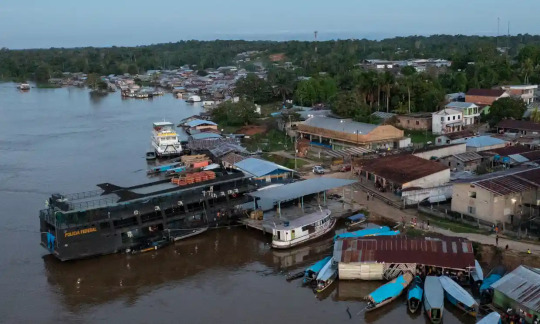
Three assassins walked into a bar deep in the Brazilian Amazon one night last October. Beers flowed, tongues loosened and the men were overheard bragging about their latest job. “We’re looking for this Orlando bloke. We’ve come to kill him,” one of the inebriated hitmen is said to have declared, according to a tipoff conveyed to their target.
The Orlando in question was Orlando Possuelo, one of the Indigenous defenders who has been seeking to carry on the work of his colleague Bruno Pereira since Pereira was killed along with the British journalist Dom Phillips near the Javari valley Indigenous territory last June.
The planned killing did not come to pass. Who ordered it is unclear. But Possuelo, who has seen two close associates murdered in the past four years, admitted the warning left him shaken. “Normally, I’m fairly relaxed about the threats … but there are days you wake up feeling a bit haunted,” he said.
One year after the killings of Pereira and Phillips – which laid bare the environmental devastation inflicted under Brazil’s former president Jair Bolsonaro – Indigenous leaders and non-Indigenous allies such as Possuelo are intensifying their battle to protect the world’s greatest rainforest and the Indigenous peoples who have lived there since long before European explorers arrived in the 16th century.
The activists are defiant in the face of the many dangers of confronting the environmental criminals and organised crime groups who have tightened their grip on the Amazon region.
“If they kill me, I’ll go to heaven, because I’m defending my territory,” said Daman Matis, 27, who helps to police a riverside government protection base on one of the waterways that illegal goldminers use to invade protected Indigenous lands.
Continue reading.
#brazil#politics#environmentalism#environmental justice#brazilian politics#indigenous rights#amazon rainforest#dom phillips#bruno araujo pereira#mod nise da silveira#image description in alt
19 notes
·
View notes